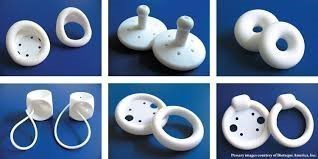
Do you have genital prolapse?
This is when the muscles and ligaments that support the pelvic floor weaken and the vaginal walls thin. The uterus, bladder, and or rectum fall down and as a result of gravity, these organs push down into the vagina.
If you answer yes, then you may be a candidate for a pessary fitting.
What is a pessary?
A pessary is a device made of medical grade silicone that is inserted into the vagina to help support the vaginal walls and thus assists with proper alignment of the prolapsed organs; the uterus, bladder and rectum. We will preform a pelvic exam and determine which type of pessary will provide the best result with each individual patient.
Management of a pessary is based on the type and shape of device inserted.
Many patients are able to remove and cleanse their own pessary, while other patients may need to return to the clinic every three month for removal and cleansing.
A pessary must be removed for a pap smear and prior to a colonoscopy.
Pessary treatment is a great option for patients who do not want surgery to repair the prolapse and or patients wanting to have more children and want to wait to have pelvic reconstruction surgery. Pessaries may be used in place of surgery and symptoms can be greatly reduced for many years with these devices.

